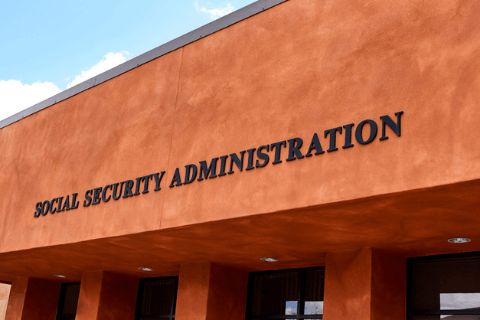Money Smart Week Sees Social Security Offices Reopening
- Written by Terry Turner
Terry Turner
Senior Financial Writer and Financial Wellness Facilitator
Terry Turner has more than 35 years of journalism experience, including covering benefits, spending and congressional action on federal programs such as Social Security and Medicare. He is a Certified Financial Wellness Facilitator through the National Wellness Institute and the Foundation for Financial Wellness and a member of the Association for Financial Counseling & Planning Education (AFCPE®).
Read More- Edited By
Savannah Pittle
Savannah Pittle
Senior Financial Editor
Savannah Pittle is a professional writer and content editor with over 16 years of professional experience across multiple industries. She has ghostwritten for entrepreneurs and industry leaders and been published in mediums such as The Huffington Post, Southern Living and Interior Appeal Magazine.
Read More- Published: April 28, 2022
- 3 min read time
- This page features 7 Cited Research Articles
- Edited By

A spokeswoman for the Social Security Administration spread the news of reopened Social Security offices largely closed during the pandemic along with tips for shutting down Social Security scams as part of Money Smart Week this year.
“Social Security will add more in-person appointments and offer in-person services for people without an appointment,” Charo Boyd, a Social Security Administration public affairs specialist for SSA’s Chicago Region, announced during a national Money Smart Week webinar.
The reopening of Social Security offices around the United States came in time for Money Smart Week — April 9 to April 16, 2022 — an annual public awareness campaign by the Federal Reserve Bank of Chicago to improve personal finance education in the United States.
Boyd led a virtual presentation on the basics of Social Security retirement, survivorship and disability benefits with updates on office reopenings and quick steps individuals can take to stop Social Security scams in their tracks.
Social Security Offices Reopen for Business
More than 1,200 Social Security offices began reopening to people without appointments on April 7.
SSA offices around the country have been largely closed to the public since the start of the COVID-19 pandemic in March 2020. Only limited, in-person service was available — and then only by appointment.
Boyd said “millions of people” accessed Social Security online or by phone during the pandemic, adding that doing so is “convenient and secure.”
Since the reopenings, some cities have reinstituted COVID-19 restrictions in parts of the country where the Omicron BA variant has led to an uptick in coronavirus cases. Some local offices may be affected by local conditions.
You can check to see if you still need to make an appointment before visiting by going to the Social Security Administration FAQ page online.
“For people who can access our services, online or by phone, we ask that they continue to do business with us this way — and schedule an appointment if possible,” Boyd said. “This will better allow us to timely serve people who can use those [phone and online] options.”
Beating a Pandemic Social Security Scam
Almost as soon as Social Security offices closed during the pandemic, a new Social Security scam took off and continues to be among the most common scam of its type nearly two years later.
“If you receive a call, a text or an email saying your Social Security number has been suspended, or they threaten arrest or legal action — or demand immediate payment — it is a scam,” Boyd said.
Social Security Inspector General Gail Ennis first warned of the scam on March 20, 2020 — just three days after offices closed during the pandemic.
How To Spot a Social Security Phone or Email Scam
- The message threatens you with suspending your benefits or Social Security number
- The message threatens you with arrest or legal action unless you pay a fine or fee
- The sender requires payment with a gift card, internet currency, prepaid debit card, cash or wire transfer
- The message demands you keep any assistance you receive from Social Security a secret
Source: U.S. Social Security Administration
Boyd said there are only three things to do when you receive any communications from someone claiming to be from Social Security and threatening or demanding you do something.
“Ignore it — simply hang up and report it to Social Security,” Boyd said.
You can report scams by using an online form on the Social Security website.
Money Smart Week Promotes Personal Finance Education
The Federal Reserve Bank of Chicago created Smart Money Week in 2002 to promote personal finance education for consumers. Thousands of local organizations across the country ranging from businesses to libraries and nonprofit organizations join each year.
Topics cover all stages of life, income levels and areas of personal finance from buying a first home to retirement planning and savings.
You can still catch up on current and past webinars and other materials for a limited time at the Money Smart Week website.
In addition to the Social Security webinar, there are virtual sessions on money and nutrition, building and improving your credit and options and tools for buying or refinancing a home.
Your web browser is no longer supported by Microsoft. Update your browser for more security, speed and compatibility.
If you need help pricing and building your medicare plan, call us at 844-572-0696